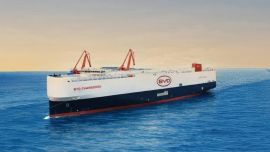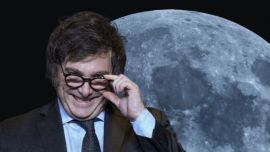President Alberto Fernández is optimistic over the future of the Mercosur regional trade bloc, but acknowledges that member states can not go it alone. “Breaking the rules is to break up Mercosur,” he admits.
In this extract from last month’s feature-length interview, the Peronist leader discusses tensions, the bloc’s future direction and ongoing talks over free-trade deals.
There were three striking features of the last Mercosur summit [in December]: it was Jair Bolsonaro’s last as president of Brazil, the bloc’s pro-tempore presidency was transferred to Argentina but essentially it was celebrated in Montevideo, where there is a conflict with a Uruguay seeking a more flexible Mercosur against the opposition of Brazil, Paraguay and Argentina. Did you manage to find any kind of understanding with Uruguay? And how do you imagine the Mercosur with which you will have to deal with [Luiz Inácio] Lula [da Silva becoming] president within a month?
What all four countries want is unity in the region. I’ve known Luis Lacalle [Pou] for a long time – we have different political outlooks, of course. But I was trying to explain to Luis that I have a different outlook on what is going on in the world. Luis feels that the post-pandemic world is opening up while I feel that it is closing down.
I was talking recently to [economist] Mariana Mazzucato, whose latest book Misión Economía I recommend, and she explained carefully what is going on, inviting us to reflect on the future of capitalism. And there you see companies relocating rather than moving out. Thus Germany, which had shipped out its production to China, now wants to start manufacturing in Germany again due to freight rates while the United States, which had been increasingly producing in Mexico, is now bringing its industry home, again due to freight costs.
The world has changed. But what is growing is not so much nationalism as regional feeling. The European Union is seeking ways of making itself a stronger bloc in the midst of the war it is enduring, as is NAFTA, so we in Mercosur must do the same. When these ideas of free trade treaties between individual countries appear, one is not so much in disagreement with such treaties as with breaking Mercosur rules, which would need the consent of member countries.
Hence my commentary that my first rule is always to keep the rules. If that is the way ahead, then let’s discuss it and see if we can all agree. But if we don’t agree and go changing the rules so everybody does what they please...
Which would be to break up Mercosur in that event.
Of course, breaking the rules is to break up Mercosur.
On your recent trip to Europe there was talk of the Mercosur-EU [free-trade] agreement. Do you expect Lula coming to power in Brazil to permit a more rapid advance?
Lula’s outlook is the same as mine on this issue and let’s be frank. Europe found Bolsonaro very unpleasant and heaped all the blame on him, perhaps with some justice, for his policies of Amazon deforestation, accusing him of breaching the rules of the Paris Agreement on climate change, whose crisis he deepened. All that is true but it is not what is stopping the agreement with Mercosur.
It was just an excuse.
It was the excuse, exactly. What is really stopping the agreement is agricultural protectionism whose many measures are closing down frontiers and blocking the access of Argentine products to those markets. That is what is going on in France.
And Brazilian products too.
That is happening to Brazilian products in France and also in Ireland and Poland. So why was this agreement signed in the [Mauricio] Macri Presidency never approved by the European Union? Because those three countries did not give it parliamentary approval and the rules say that it must be approved by all EU members.
So we have a problem. Firstly, because they do not allow our products entry but also thinking of the auto industry where we would compete with the European auto industry with its duty-free system. That would be the end of our activities in that sector. Brazil and Argentina are the only car-makers in all South America so why should we lose that industry? An agreement where we lose such an industry is an agreement where we lose a lot so we have to sit down again. I believe firmly in an agreement with Europe but we must revise asymmetries and reach an agreement which suits both sides because an agreement which only suits one side is not a business deal.
In 2023 Spain will be taking over the pro-tempore presidency of the European Council. You have a very close relationship with Spain and with Lula and recently [European Commission Vice-President] Josep Borrell passing through Buenos Aires said – and I quote: “This has to be the year of Latin America in Europe and of Europe in Latin America.” Do you see any possibility of accelerating an agreement with Europe or is the war in Ukraine consuming all energies?
To be able to think about that agreement, we have to bear in mind what I have just said. The asymmetries must be redesigned and solved. That’s what I say to everybody – I’ve spoken on this to [German Chancellors Angela] Merkel and [Olaf] Scholz and told them both the same. I’ve told [French President Emmanuel] Macron, the European leader with whom I deal most assiduously, any number of times and often enough with [Spanish premier] Pedro Sánchez. But it takes two to tango and these things must be revised. We cannot accept this agreement on the industrial side because the damage to Mercosur industries is very great. Uruguay and Paraguay feel it less because they are less industrialised than Argentina and Brazil. But our two countries feel it very much.

























Comments